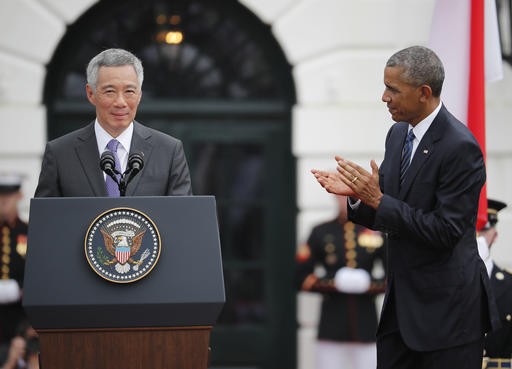US credibility at stake if trade pact not ratified: Singapore
Change Size
 President Barack Obama applauds while listening to Singapore's Prime Minister Lee Hsien Loong during a state arrival ceremony on the South Lawn of the White House in Washington, on Aug. 2, 2016. (AP/Pablo Martinez Monsivais)
President Barack Obama applauds while listening to Singapore's Prime Minister Lee Hsien Loong during a state arrival ceremony on the South Lawn of the White House in Washington, on Aug. 2, 2016. (AP/Pablo Martinez Monsivais)
T
he United States risks injuring its standing and credibility with countries around the world if the Trans-Pacific Partnership (TPP) trade deal is rejected by its lawmakers, Prime Minister Lee Hsien Loong said.
It will be a "very big setback for America" as some countries, like Japan, have gone out of their way to support the 12-nation Pacific Rim trade pact, he added.
The pact, which the Obama administration supports, is before Congress which is in recess until after the Nov. 8 presidential election.
Lee, in an interview published on Wednesday in the Time magazine, a US weekly, also said the pact needs to be ratified by January. Otherwise, it would be a "casualty" of the US presidential election because both candidates —Hillary Clinton and Donald Trump — are opposed to it.
Lee indicated that he was not optimistic about the pact being ratified by then.
PM Lee said that while change cannot be stopped, the government can help in training, transition assistance and social support if people are out of a job.
The TPP, co-founded by Singapore, aims to create a giant free-trade zone and give 12 countries access to 800 million consumers, representing one-third of the global trade. It is a key thrust of the US' foreign policy in Asia aimed at balancing China's rising influence in the Asia-Pacific.
Lee said China sees trade as an extension of its foreign policy, going around to countries "with lollipops in its pockets" like giving aid or building them key government office buildings. The US does not "do these retail items," he added.
"The one big thing which you have done is to settle the TPP, which Obama has done. It shows that you are serious, that you are prepared to deepen the relationship and that you are putting a stake here which you will have an interest in upholding," he added.
But its credibility will take a hard knock if the pact falls through.
Japanese Prime Minister Shinzo Abe "has made very difficult arrangements on agriculture, cars, sugar and dairy," Lee noted.
"Now you say, 'I walk away, that I do not believe in this deal.' How can anybody believe in you any more?"
Similarly, the US risks losing credibility in strategic issues, he added. Citing North Korea, he said the country is unpredictable and is developing its nuclear capabilities and missiles.
"You do not want the South Koreans to do that, you do not want the Japanese to do that. What is the restraint on them? It is your credibility as an ally and as a deterrent.
"I do not think failing to ratify the TPP will strengthen that at all.''
There also seems to be a lack of strategic trust between US and China, Lee said.
"The Chinese are convinced you are trying to slow their growth and you are convinced that the Chinese may do something unpredictable."
To ensure China does not push against the interest of the US, dialogue between them must happen at the top, he said. He noted the US-China relationship is broad, but also different from that of the US and the Soviet Union in the Cold War.
Then, they could rely on "back channels" like former US Secretary of State Henry Kissinger's relationships with former Soviet ambassador to Washington Anatoly F. Dobrynin and former Soviet foreign minister Andrei Gromyko.
"They were opponents, but they made some progress," he added.
"Now you have the mechanisms with China... But I am not sure of the degree to which you are able to engage and come down to brass tacks."
On the domestic front, Lee talked about the challenges facing Singapore as it restructures its economy and prepares its people for disruptive technologies.
"There are things you can do to help: Training, transition assistance, social support if people are out of a job. But you cannot stop the change from happening," he said.






